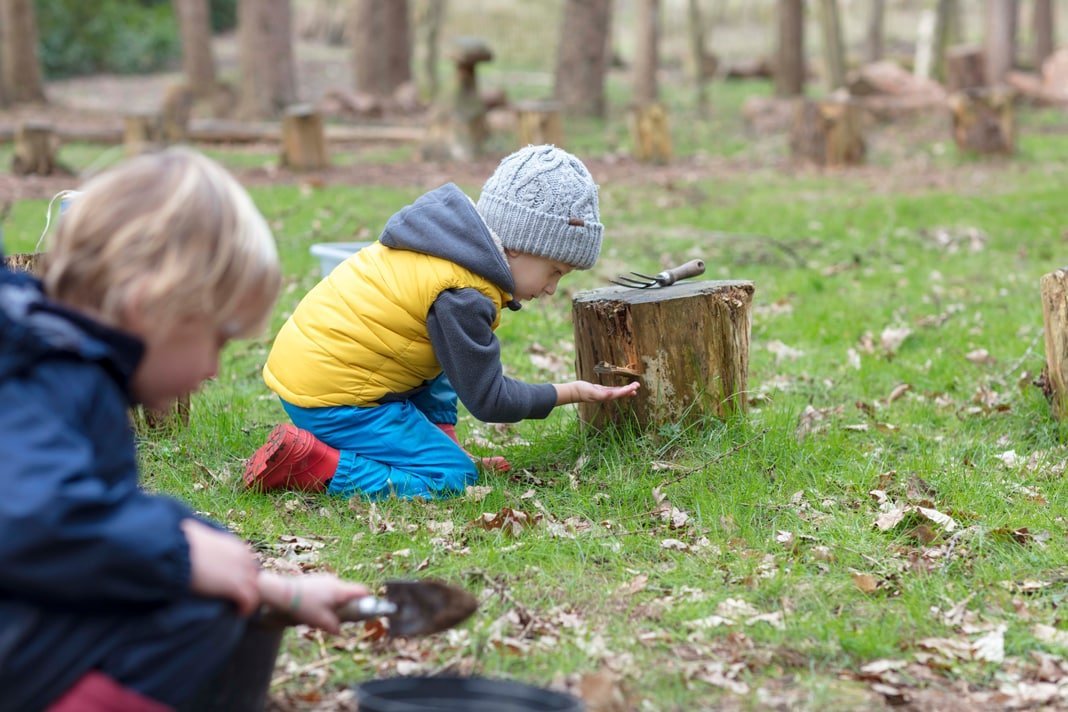ACS Cobham Forest School teacher and trainer Chris Hupp says that the value of learning through nature goes way beyond childhood fun in the great outdoors
When I am asked by parents or other educators what it is we do in Forest School, I often share stories of children involved in what is perceived as a dangerous or risky activity. For example, this could be the building of a handmade fire pit in the middle of the woods using only the tools around us. The end result is a child immersed in the mysteriousness of fire –which in itself is an experience I believe should be explored in childhood – but behind the scenes there is much more to the story.
The child who has eventually built this fire in the woods may have taken weeks to master the skills to do so. They probably will have failed many times, but have had to be resilient and keep coming back to the task. They have had to work with their peers to get the process right. They have had to take responsibility for their actions and anticipate the consequences of a single bad decision. Finally, and without a doubt, the child has taken pride in their efforts and relished the successful end result – toasting marshmallows on their self-built fire surrounded by nature.
Initiating dozens of students into the secrets of fire is not something you would expect to see from a classroom teacher, yet for me it is one of the most significant skills that you can introduce to a child. I always think back to my own childhood and remember that these kinds of activities were such an integral part of my own lived experience. Many of my generation were fortunate enough to participate in adventurous and risky play growing up. We had plenty of opportunity to run wild, far from the eyes of adults, and to choose our own paths for the day, returning only in time for dinner with scabby knees and grubby hands.
“It is hard to ignore that within the last few decades the radius of childhood has shrunk dramatically”
Daring activities are a natural part of childhood and there is a great deal of earthly savvy wrapped up in building fires, climbing trees, sticking our fingers into money holes and holding animals. This is a part of the terrain of human experience that we all know children should explore, but we also know that this is under threat. Even if we – as teachers or parents – do our best to guide our children outside, it is hard to ignore that within the last few decades the radius of childhood has shrunk dramatically. Many of my generation’s taken-for-granted childhood experiences have slowly eroded away.
Now, the allure of screens has become impossible to ignore. Children know more about YouTube and Instagram than they do about tree houses, caterpillars and skipping stones. Some of our most cherished landscapes and seascapes have also changed – littered with rubbish, under threat from invasive species and constantly overshadowed by the incessant noise of people and traffic. These impacts go beyond childhood and, as a population, we all have a growing disconnect with the natural world. We have become less aware of the land, the cycles of the moon and the subtle changes through seasons, also meaning we have been slow to spot the loss of biodiversity.

Outdoor learning, I have seen, can be a powerful way of re-connecting children with the natural world, resulting in profound benefits not only for the world we live in, but also the state of mind of individuals. With Forest School, we are able to develop the whole child through varied experiences within a dynamic learning community. We are able to foster a new kind of learner that is a companion of nature and participates and learns within it.
Outdoor education is more than just learning about nature – It is going on a journey. It is allowing time for creativity, imagination and co-operative learning to flourish. It emphasises real-life problem solving in a rich context, which helps to build increased resilience to the many hurdles children will face throughout their lives. In addition to increased resilience, outdoor learning can have a profound impact on the overall wellbeing of a child. It is the sharing of success when working together to build a den. It is the pride children feel when they have made a habitat for a wild animal or picked up rubbish in the woods. It is being able to describe all those mysterious creatures in the school pond – and watching things grow and change.
In a world where it is easy for us all to feel disconnected from nature – and, as a result, disconnected from the world around us – outdoor learning enables us to plant the seeds of wonder, of magic, into the hearts and minds of all children that pass through our school. Critical to personal wellbeing is developing an ecological sense of self. What is more, if we can help our children understand their place as within nature – not above or apart from it – we can help build a better future for our planet and for the lives of the next generation.
ACS Cobham acs-schools.com/cobham
Further reading; Moulsford Prep on the benefits of forest school
You may also like...






























